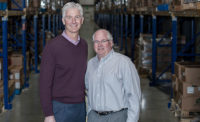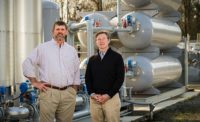Texas native Earl Campbell stands as one of the best running backs to have ever played the game of football, featuring a rare combination of size, strength and speed that not many runners have ever displayed on the field. Campbell charged his way into the Pro Football Hall of Fame by punishing defenders at the point of attack or sprinting by them with blazing speed (or both) with great success throughout the course of his college and pro career.
Meanwhile, in Waelder, Texas, J Bar B Foods was honing its skills and developing a top-notch reputation as a private-label-centric sausage processor serving a regional audience and growing at a steady clip over five-plus decades.
Little did anyone know, when J Bar B Foods acquired Earl Campbell’s brand of sausage products in 2000 (after having produced the products as a private-label venture years prior), it would prove symbolic of the company that J Bar B Foods had become.
Much like the namesake of its primary brand, J Bar B Foods has been able to translate a rare combination of positive attributes — albeit not size, strength and speed in a football sense — into outstanding growth and success.
At no time was this more evident than nearly a decade ago, when J Bar B Foods’ Weimar, Texas, processing plant became the first facility in the United States to install a co-extrusion (co-ex) system for sausage — cementing the company’s reputation as an innovator in the business.
“The acceptance of co-extrusion technology and product since its introduction has been overwhelming. It has become an industry standard for some of the leading national brands and also for private-label sausage production,” explains Danny “D.J.” Janecka II, CEO of J Bar B Foods and third-generation family member in charge of the company. “We are proud of being an innovator of this technology, and our business continues to grow utilizing co-ex.”
Indeed it has: Today, the company has expanded its barbecue product offerings, launched a new line of vacuum-sealed tray-packed meal solutions and continued to grow its geographic footprint. Frankly, the success brought on by the co-extrusion system has allowed J Bar B Foods to evolve into more than a regional, private-label sausage manufacturer, with greater success in its sights.
Hitting the holes
The past decade has been a wild ride upward, but J Bar B Foods aims to capitalize on opportunities to further expand. At presstime, the company expected to open a significant expansion of its Weimar plant (which was under construction during The National Provisioner’s visit) in the first quarter of 2015.
“The technology we will employ in our current Weimer expansion is truly ‘cutting edge.’” explains Jere Null, president of J Bar B Foods. “It will be a very highly efficient, highly consistent, production-driven system that is somewhat revolutionary compared to where the rest of the industry is today.”
The expansion is expected to give J Bar B as much as 15 million to 20 million additional pounds of sausage production capacity, and a couple added benefits, according to Pete Beckwith, senior vice president, J Bar B Foods.
“Pure capacity-wise, we need it because we’re at capacity as it is,” he says. “It’s also a chance to streamline the [original] machine, because we can put rings on that machine and links on the new machine, or vice versa, and that’s whether it’s more branded volume or private-label volume.”
That flexibility is coming at the perfect moment, as the Earl Campbell brand, specifically, continues to charge ahead in the marketplace. Danny Janecka, chairman (and D.J.’s father), says the brand has more than doubled in growth in recent years — a far cry from what Earl Campbell sausage was: a regional brand that didn’t have the infrastructure necessary to grow much larger.
“We thought it was only a regional brand, that it would only sell well in Texas,” Janecka explains, “but everywhere that we’ve taken it out of state, it sells well, and it’s the flavor that consumers like.”
Beckwith relays that the Earl Campbell brand still has “tremendous growth opportunities.”
“When I arrived, it was pretty impressive that the brand kept its consumers, even as competitors offered alternatives at lower price points,” Beckwith says. “So, with a dedicated consumer here, we asked, ‘How do we get more consumers, how do we add products to the line, and how do we go fishing in a bigger lake versus just the links segment?’ That’s where we are today.”
Currently, the primary area for growth is geographic — the brand currently is making a serious push westward from Texas, and it is available “from Washington state to North Carolina,” says Beckwith.
“We always say, ‘We’ll grow the Earl Campbell brand one toothpick at a time if we have to,’ because when people eat it, they come back to it,” he adds. “And the hotlinks have what I would almost call a cult following.”
Null says that kind of success is helping the company make Earl Campbell the football equivalent of legendary musician Jimmy Dean.
“Earl Campbell is a Texas icon, and we’re proud of our association with him,” Null says. “But the farther you go from Texas, where Earl might not be a football icon, he’ll be a sausage icon — just like Jimmy Dean. Many people don’t know Jimmy Dean was a singer; they see Jimmy Dean as a sausage guy.”
Making them miss
Adding a line and growing a brand through traditional methods doesn’t make the J Bar B Foods story all that unique. Many meat and poultry processors perform this simple “blocking and tackling” well every day.
What helps J Bar B Foods stand out is the simultaneous expansion of its overall product line beyond sausage. The transition in focus toward that of a more diversified food company began roughly five years ago, according to D.J. Janecka.
“We had always produced some barbecue products, but now we’re focused on becoming a full-line barbecue company,” he says. “Once we launched the barbecue effort, it put us into the meals segment — so we created additional meals outside of the barbecue category but were still manageable from a manufacturing standpoint.”
Today, J Bar B Foods produces beef, pork and chicken products that complement the company’s sausage heritage and are marketed as both branded and private-label products.
Beckwith says the company filled a need in the meals segment, as it had become stale, lacking variety for consumers and featuring a price point that was too high for consumers.
“We’ve done some different things, as far as putting noodles or starches in, for example,” he says. “We’ve come up with some meals that we think have some more attractive price points to draw everyday consumers in there for purchases and smooth out those peaks and valleys.”
Breaking tackles, breaking away
With a major plant expansion nearly finished and a significant geographic push for the Earl Campbell brand under way, one might suspect that J Bar B Foods would keep its growth curve on the conservative side in the coming years. But Danny Janecka believes that, despite being founded 56 years ago by his father, J Bar B Foods is “in its infancy” even today.
“We pretty much have grown beyond what I ever thought we would do,” he says. “But we have so much opportunity for growth, that it’s really unbelievable.”
Janecka adds that the company reasonably could begin to investigate acquisitions in order to expand its market reach. However, it’s worth noting, a successful company doesn’t stop looking for an edge, and often, that company can make significant gains in the short term by improving operational efficiency — one of the reasons Null was added to the executive team.
“What excites me is, there are still good opportunities for us to increase efficiency, increase consistency, and we can bring to the organization a continuous-improvement mentality,” Null says. “There are things we can adopt that bigger companies do, but the key is not losing who we are, how we treat people and how our customers see us. … We’re a very customer-driven company today, and we don’t want to lose that as we get bigger.”
D.J. Janecka agrees and says improved technology will help drive success over the next several years.
“Over the next few years, our plan is to continue to diversify but not veer too far off course with regard to our core competencies,” he explains. “I foresee continued innovation and experimentation with different production formats to reduce costs, and automation will become more prevalent in the future to help address the sometimes difficult labor situation.”
Beckwith adds that J Bar B Foods certainly will evolve on the sales and marketing side.
“We’ll become more of a marketing company supporting the brands that we have, with more traditional CPG types of activities,” he says. “But it will still be sort of a guerrilla marketing, because, as we get bigger, we want to maintain all of the attributes that we were when we were smaller.”
With a strong management team blending the Janecka family heritage with an experienced outside perspective, J Bar B Foods appears ready to take its game to the next level.
“‘Quality versus quantity’ would be the best way to describe our future,” says D.J. Janecka. “We want to continue to grow but not sacrifice our reputation [as an innovator] to do it. … J Bar B is 56 years old this year, and we have managed to maintain double-digit growth over the last 10 years while still abiding by the principles that my grandfather instilled in the organization in 1959.”
Just as Earl Campbell wasn’t the first and won’t be the last running back to feature the rare combination of size, strength and speed, neither is J Bar B Foods the first or last highly innovative, nimble processing company.
Yet with proven abilities as a fast-growing regional processor who has taken Texas by storm and is now “making headlines” as an innovator to a wider audience, J Bar B Foods appears headed toward further success in the protein-processing equivalent of the “big leagues.”









Report Abusive Comment